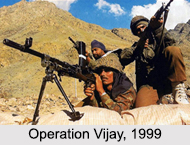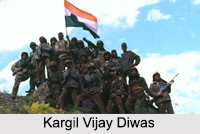 Operation Vijay, also known as the "Kargil War", was an armed conflict between India and Pakistan that took place between May and July 1999 in the Kargil district of Jammu and Kashmir. The cause of the war was the infiltration of Pakistani soldiers and Kashmiri militants into positions on the Indian side of the Line of Control. The Indian Army, supported by the Indian Air Force (IAF), attacked the Pakistani positions and with international diplomatic support, eventually forced a Pakistani withdrawal across the Line of Control (LoC).
Operation Vijay, also known as the "Kargil War", was an armed conflict between India and Pakistan that took place between May and July 1999 in the Kargil district of Jammu and Kashmir. The cause of the war was the infiltration of Pakistani soldiers and Kashmiri militants into positions on the Indian side of the Line of Control. The Indian Army, supported by the Indian Air Force (IAF), attacked the Pakistani positions and with international diplomatic support, eventually forced a Pakistani withdrawal across the Line of Control (LoC).
Beginning of Operation Vijay
It is believed that the planning for the operation, by Pakistan, may have occurred about as early as the autumn of 1998. Since mid-1998, Pakistani paramilitary forces and Kashmiri insurgents commenced occupation of dominating heights in Kargil. Although strategic, these heights had to be vacated by the Indian Army with the onset of severe winters and were again re-occupied during spring season. Pakistan army provided military and logistics support to the infiltrators who had taken control of these areas. Consequently, the enemy had direct observation of Srinagar-Leh Highway (NH-1), from where they could effectively interdict Indian logistics columns plying on the highway. By the end of May 1999, India and Pakistan were at war and Operation Vijay was on full swing.
 By 30th June 1999, the Indian Armed forces were prepared for a major high-altitude offensive against Pakistani posts along the border in the disputed Kashmir region. Over the previous 6 weeks India had moved 5 infantry divisions, 5 independent brigades and 44 battalions of paramilitary troops to Kashmir. Once the scale of the Pakistani incursion was realised, the Indian Army mobilised over 2,00,000 troops to launch "Operation Vijay" and evict the intruders.
By 30th June 1999, the Indian Armed forces were prepared for a major high-altitude offensive against Pakistani posts along the border in the disputed Kashmir region. Over the previous 6 weeks India had moved 5 infantry divisions, 5 independent brigades and 44 battalions of paramilitary troops to Kashmir. Once the scale of the Pakistani incursion was realised, the Indian Army mobilised over 2,00,000 troops to launch "Operation Vijay" and evict the intruders.
The war was very difficult for the Indian sides to win as the Pakistanis had an altitudinal advantage which helped them to easily target Indian soldiers who were climbing the mountain. Ranging between 16,000 to 18,000 feet, the heights were very dominating and posed a formidable challenge for the Indian troops. The first priority for Indian troops was to recapture peaks that were in the immediate vicinity of the NH 1A and included the Tiger Hill and Tololing complex in Dras. This was followed by recapture of crucial heights in the Batalik-Turtok Sub-sector which provided access to the Siachen Glacier. Point 4590, which was closest to NH1A, in this sector, was recaptured by Indian forces on 14th June 1999. The victory came up after the sacrifice of around 527 Indian soldiers.
Victory of Operation Vijay
Finally, on 14 July 1999, Indian Army announced the complete eviction of Pakistani intruders and with this Operation Vijay officially came to an end. However, the then Indian Prime Minister Atal Bihari Vajpayee declared the end of the Kargil conflict on July 26, 1999 and the date is celebrated as "Kargil Vijay Diwas".






